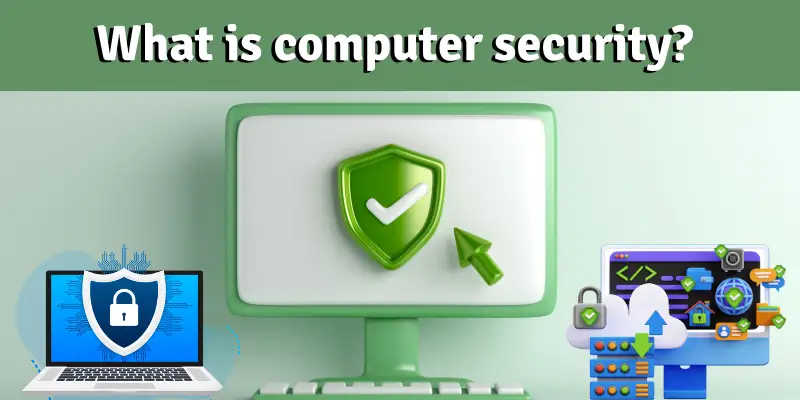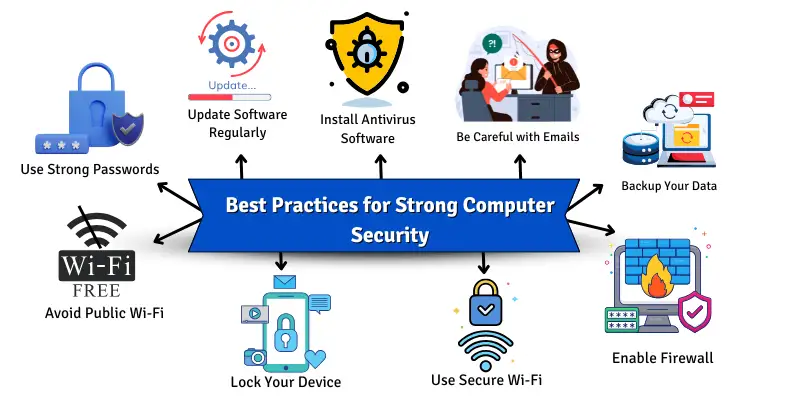What is Computer Security
Published: 22 Mar 2025
Previously, we discussed What is a computer?” where we learned the basics of how computers work. Now, let’s talk about something equally important—computer security. Imagine turning on your computer one day and finding everything missing or broken because someone attacked it. Scary, right? But don’t worry! Computer security helps protect your computer and keeps your information safe from harm. Let’s find out!

What is computer security?
Computer security protects computers, networks, and data from damage, theft, or unauthorized access. It helps protect your personal information from hackers, viruses, and other online threats. This includes using software like antivirus programs and firewalls to block harmful attacks. Good computer security also means creating strong passwords and being careful online.
Importance of Computer Security
Computer security is crucial because it helps protect your personal information and ensures your devices work safely. Without it, your data could be at risk of being stolen, damaged, or misused.
Here are the 5 importances of computer security:
- Protects personal information from hackers and thieves.
- Keeps your computer and data safe from viruses and malware.
- Prevents identity theft and fraud.
- Ensures your files and documents stay safe and secure.
- It helps maintain privacy and avoid unwanted online attacks.
Types of Computer Security
Computer security helps protect your devices and data from harm. Different types of computer security guard against various threats and keep your information safe.
Here are the types of computer security:
- Network Security: It protects your network from unauthorized users and attacks.
- Information Security: It protects your personal data from being stolen or misused.
- Application Security: It makes sure software is free from bugs and security threats.
- Endpoint Security: It protects individual devices, like computers and phones, from attacks.
- Cloud Security: It keeps your data safe when stored on cloud services.
- Internet Security: It protects you from dangerous websites and hackers online.
- Physical Security: It stops theft or damage to your computer and other devices.
- Cybersecurity: It protects all computer systems, networks, and data from online threats like hackers, viruses, and malware

Computer Security Threats
Computer security threats are harmful activities or attacks that can damage or steal your data. Understanding these threats helps you protect your computer and personal information.

Types of Computer Security Threats:
- Viruses are harmful programs that damage your computer and spread to other files.
- Malware: This software is designed to damage your computer or steal your personal data.
- Phishing: Fraudulent emails or websites deceive you into sharing sensitive information, such as passwords.
- Spyware: This software secretly watches what you do on your computer and steals information.
- Ransomware: This locks your computer and asks for money to unlock it.
- Trojan Horses: These programs seem safe but cause damage once opened.
- Adware: This software shows unwanted ads and can slow down your computer.
- Social Engineering: This is when people trick you into sharing private information.
Best Practices of Computer Security
Follow some simple rules to keep your computer safe. These best practices help protect your computer and data from dangers.

Here are the best practices for computer security:
- Use Strong Passwords: Make passwords long and hard to guess.
- Update Software Regularly: Keep your programs updated to fix security problems.
- Install Antivirus Software: Use antivirus to catch viruses and malware.
- Be Careful with Emails: Don’t open emails from strangers or click on unknown links.
- Backup Your Data: Save your important files in more than one place, like an external drive.
- Enable Firewall: Turn on your computer’s firewall to block harmful connections.
- Use Secure Wi-Fi: Protect your network with a strong password to keep it safe from threats.
- Avoid Public Wi-Fi for Important Tasks: Don’t log into important accounts when using public Wi-Fi.
- Lock Your Device: Always lock your computer or phone when you’re not using it.
Security Software for Computers
Security software is important for keeping your computer safe. It helps protect your data from viruses, hackers, and other online threats.
Here are some common types of security software:
- Antivirus Software: It helps find and remove viruses from your computer.
- Firewall: It blocks harmful traffic from entering your computer.
- Anti-Malware: It stops harmful software from attacking your computer.
- Spyware Removal Software protects your computer from spyware, which collects your personal information.
- Encryption Software: It keeps your data safe by turning it into secret code.
- VPN (Virtual Private Network): It hides your online activities and protects your privacy.
- Password Manager: It helps you store and manage your passwords safely.
Now, here are some popular security software products you can use in 2025:
- Bitdefender Total Security – Offers antivirus, anti-malware, firewall, and more.
- Malwarebytes – Specializes in detecting and removing malware and ransomware.
- Norton 360 Deluxe – A complete security suite with antivirus, VPN, and identity protection.
- Trend Micro protects against viruses, ransomware, and phishing.
- McAfee Total Protection—Includes antivirus, firewall, and identity protection.
- ESET provides complete security against viruses, malware, and online threats.
Advantages and disadvantages of computer security
Computer security protects our devices and personal information from online threats. While it offers many benefits, there are also some drawbacks to consider. Let’s explore the advantages and disadvantages of computer security.
| Benefits |
|---|
|
| Drawbacks |
|---|
|
Conclusion
So, guys, it’s time to finish up! In this article, we’ve covered computer security in detail. I suggest using strong passwords and keeping your computer safe from hackers. Always update your software and avoid clicking on unknown links. Stay safe online, and tell your friends about computer security! Want to learn more? Please read our other articles.
Common Questions about Computer Security
Here are some common questions about computer security
Why does my antivirus software keep detecting threats on my computer?
Your antivirus software may detect threats if your computer has been exposed to malware or suspicious files. It could also be false positives, meaning harmless files are incorrectly flagged. Ensure your antivirus is up-to-date and run a full scan to remove any threats.
Why do I need to update my software regularly for computer security?
Software updates fix known security vulnerabilities that hackers can exploit. Updating your software ensures that you are protected from the latest threats. It’s important to turn on automatic updates to stay safe without worrying about it.
What should I do if I think someone hacked my account?
Change your password immediately and enable two-factor authentication. Contact the service provider for help securing your account. Review your recent activity to spot any unauthorized actions.
Can computer security slow down my device?
Yes, security software may use some system resources, which can cause your computer to slow down. However, the benefits of protection outweigh this minor inconvenience. You can adjust settings to reduce impact, such as scheduling scans when not using the computer.
What are the common types of computer security threats?
Common threats include viruses, malware, ransomware, and phishing attacks. Hackers often use these to steal your data or cause damage to your system. Protecting your computer from these threats is essential for your safety.

- Be Respectful
- Stay Relevant
- Stay Positive
- True Feedback
- Encourage Discussion
- Avoid Spamming
- No Fake News
- Don't Copy-Paste
- No Personal Attacks

- Be Respectful
- Stay Relevant
- Stay Positive
- True Feedback
- Encourage Discussion
- Avoid Spamming
- No Fake News
- Don't Copy-Paste
- No Personal Attacks
